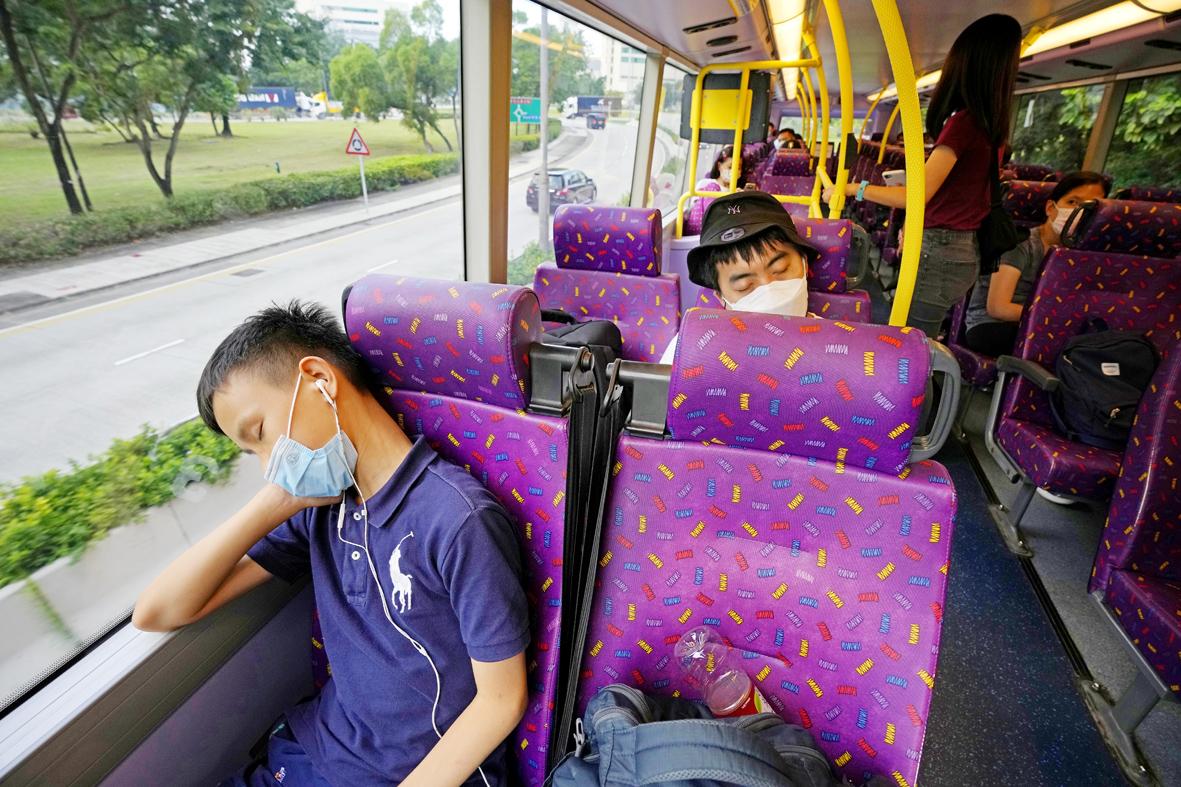Travel-starved, sleep-deprived residents might find a new Hong Kong bus tour to be a snooze.
The 76-kilometer, five-hour ride on a regular double-decker bus around the territory is meant to appeal to people who are easily lulled asleep by long rides. It was inspired by the tendency of tired commuters to fall asleep on public transit.
“When we were brainstorming new tours, I saw a social media post from my friend saying that he was stressed out by his work, he couldn’t sleep at night,” said Kenneth Kong, the marketing and business development manager of ulu travel, the organizer of the bus tours.

Photo: AP
“But when he was traveling on the bus, he was able to sleep well. His post inspired us to create this tour that lets passengers just sleep on the bus.”
Tickets cost between US$13 to US$51 per person, depending on whether they choose seats on the upper or lower deck. A goodie bag for passengers includes an eye-mask and ear plugs for better sleep.
The first “Sleeping Bus Tour” last Saturday sold out entirely. Some passengers came prepared, bringing their own blankets and changing their shoes to slippers, while others brought travel pillows.
“I have been suffering from insomnia so I am here to try and get some sleep,” said 25-year-old Anson Kong, one of the passengers on the first bus tour. He said that the tour was a good idea and “more interesting” than he expected.
On last Saturday’s tour, the bus stopped so passengers could take photos at scenic spots on the city’s Lantau Island. One stop was the aircraft maintenance area near Hong Kong’s airport, where passengers can snag selfies with aircraft in the background.
Another passenger, Marco Yung, said that he joined the tour because he usually falls asleep on long-distance bus journeys, saying it was a “great opportunity” to get some sleep.
The tendency to fall sleep on public transport is a type of conditioning, according to Dr. Shirley Li, the principal investigator of the Sleep Research Clinic and Laboratory at the University of Hong Kong.
“People in Hong Kong don’t have enough time to sleep,” Li said. “That’s why we have to kind of use other times to sleep, which is our daily commute, especially when we are travelling on public transport.” “For some people, they may tend to associate public transport with their sleep. And that’s why they found it easier to fall asleep on the bus,” she said.”

While Americans face the upcoming second Donald Trump presidency with bright optimism/existential dread in Taiwan there are also varying opinions on what the impact will be here. Regardless of what one thinks of Trump personally and his first administration, US-Taiwan relations blossomed. Relative to the previous Obama administration, arms sales rocketed from US$14 billion during Obama’s eight years to US$18 billion in four years under Trump. High-profile visits by administration officials, bipartisan Congressional delegations, more and higher-level government-to-government direct contacts were all increased under Trump, setting the stage and example for the Biden administration to follow. However, Trump administration secretary

A “meta” detective series in which a struggling Asian waiter becomes the unlikely hero of a police procedural-style criminal conspiracy, Interior Chinatown satirizes Hollywood’s stereotypical treatment of minorities — while also nodding to the progress the industry has belatedly made. The new show, out on Disney-owned Hulu next Tuesday, is based on the critically adored novel by US author Charles Yu (游朝凱), who is of Taiwanese descent. Yu’s 2020 bestseller delivered a humorous takedown of racism in US society through the adventures of Willis Wu, a Hollywood extra reduced to playing roles like “Background Oriental Male” but who dreams of one day

Gabriel Gatehouse only got back from Florida a few minutes ago. His wheeled suitcase is still in the hallway of his London home. He was out there covering the US election for Channel 4 News and has had very little sleep, he says, but you’d never guess it from his twinkle-eyed sprightliness. His original plan was to try to get into Donald Trump’s election party at Mar-a-Lago, he tells me as he makes us each an espresso, but his contact told him to forget it; it was full, “and you don’t blag your way in when the guy’s survived two

Burnt-out love-seekers are shunning dating apps in their millions, but the apps are trying to woo them back with a counter offer: If you don’t want a lover, perhaps you just need a friend? The giants of the industry — Bumble and Match, which owns Tinder — have both created apps catering to friendly meetups, joining countless smaller platforms that have already entered the friend zone. Bumble For Friends launched in July last year and by the third quarter of this year had around 730,000 monthly active users, according to figures from market intelligence firm Sensor Tower. Bumble has also acquired the